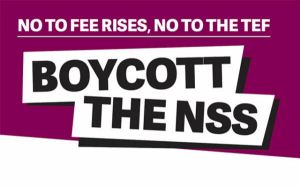The cunning plan of the National Union of Students to boycott the National Student Survey feels like a long time ago. It wasn’t so much a different news cycle as a different dimension of experience altogether. I mean, back then Andrew Adonis  looked like a supporter of the British higher education system.
looked like a supporter of the British higher education system.
Now that it’s come back to bite, it’s worth reminding ourselves of what it was all about. The NUS was aggrieved that the NSS was being used as a metric in an exercise – the Teaching Excellence Framework – that was being used to drive an agenda of marketization. It wasn’t a protest against the NSS itself, but the only way that students could see to undermine the TEF. It remains NUS policy.
The boycott has had highly marked though isolated effects. While the national response rate has dropped only four points, twelve universities did not receive sufficient responses to be able to register results. That says a lot about the NUS: passionately political on some campuses but not at others. At my university I couldn’t even find students who wanted to debate the issue.
Should the student leaders at those twelve unlisted universities be proud of themselves this morning? Doubtless they will see it as a result; many students devoted an awful lot of time and energy to sabotaging the survey. They have ensured that the 2017 NSS results will always be marked with an asterisk.
But I don’t see any chance of this stopping the TEF. That ship has sailed; the debate has moved on in the meantime to new metrical frontiers, such as learning gain and teaching intensity. While many people argue that the TEF metrics are no more than proxies of teaching quality, the direction of travel is towards more rather than fewer metrics, and also towards the granularity of subject-level assessment.
Meanwhile, the fact remains that there is only one TEF metric that directly registers the perceptions of students, and this is the NSS. It’s also been arguably the greatest single driver of reform in higher education over the past decade. I’ve seen it prompt wholesale change in poorly-performing departments. And even in my own, which generally does well, we always identify specific areas for attention: feedback, programme management, student support, resources, and so forth.
So I feel sorry for the students at those twelve unlisted universities who completed the survey. No, actually I feel bloody angry on their behalf. Their responses will be made available internally so they should still have some impact; however, they won’t be published and won’t register in league tables. A handful of managers this morning will be breathing sighs of relief, and that’s not what their students deserve. Those students paid £27000 – in fees alone – and their views matter.
I also feel sorry for the people who put so much effort into revising the NSS. The focus right now shouldn’t be on the boycott; it should be on the responses to the new questions added this year. My favourite one was: ‘I feel part of a community of staff and students’. But there was also: ‘I have had the right opportunities to work with other students as part of my course’; and ‘The IT resources and facilities have supported my learning well’. These questions help to document the full dimensions of higher education. They are light-years away from the ‘value-for-money’ reductivism of certain other student surveys that jostle for the attention of policy-makers and journalists.
The NSS also includes a section on ‘student voice’. There’s: ‘It is clear how students’ feedback on the course has been acted on’. And there’s a bleak irony to this one: ‘The students’ union effectively represents students’ academic interests’. Well, did they?
I’m not immediately sure how the NSS results will be spun as bad news, but I expect it will happen. Maybe Lord Adonis will claim that there is ‘no student satisfaction in Cambridge’. It feels like a precarious moment for the sector, and everyone – not least the students – could do with some credible data on what’s working and what needs attention. In this context, the boycott-compromised 2017 results feel like an own-goal for British higher education. I’m not sure that’s exactly what the NUS had in mind.
- This piece was first published for the Times Higher blog



